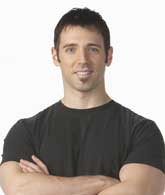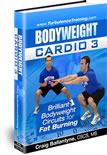Physiology and Psychology Equals Fat Loss
 Yesterday, the fitness and nutrition expert shared with us a few things about post-workout nutrition and supplements. So, if your exercising for fat loss you should always make healthy food choices by eating a healthy whole food meal. Remember eat whole food, mostly plants, not too much.
Yesterday, the fitness and nutrition expert shared with us a few things about post-workout nutrition and supplements. So, if your exercising for fat loss you should always make healthy food choices by eating a healthy whole food meal. Remember eat whole food, mostly plants, not too much.
We have covered a lot of information on fitness and nutrition over the past few days with Dr. John Berardi. As we end this expert interview series on Precision Nutrition, we look at some advice that has been very effective in his coaching programs.
*****************
Craig: Looking ahead, what do you see in 2011 as being some of the nutrition trends, good, bad, and ugly? What do you see in terms of research coming out?
John: Well, generally when it comes to sort of future prediction stuff I’m not very good, because I just look at some of the current research that’s coming out, and then I look at what we’re doing at Precision Nutrition, that keeps me busy enough. The one thing I’ve become less interested in is the idea of the perfect program. I have become more interested in helping people come up with the best plan that they can follow, which is a much more psychological thing.
That’s why I spent a lot of time today talking about change. I’ve been reading a ton of “change literature” that’s out there. This is usually a branch of psychology, but we’re starting to see it crop up in weight loss and physiology studies as well. Researchers that traditionally have done studies on exercise science are starting to look at “CHANGE RESEARCH” and applying it to fitness, fat loss, nutrition, and exercise.
Craig, I’ve realized this and you probably have to, because you’ve been in the industry helping coach people on changing their bodies for just as long as I have. We see about 10 to 20 percent of the clients who are interested in body transformations, and they actually change their lives in the way that most personal trainers and nutrition coaches ask them to change.
The advice often sounds like this, “So, you want to lose fat? Okay, great. I can help you with that. I want you to drop all your bad habits today. I want you to adopt these 15 good ones right now because I say so. So, If you can’t do all of that you’re lazy and unmotivated, and I’m going to fire you as a client.”
That’s usually how the personal training mindset is, obviously it’s a bit of a generalization but that’s kind of how it is. It’s no wonder that the other 80 to 90 percent of the people out there are labeled as lazy and unmotivated. You’re asking them to change too much too fast based on some authoritarian command. Very few people ever respond to that.
So, in addition to being a physiology expert, I’ve actually set out to become a coaching expert and a change expert. That’s why I think our coaching programs, in particular, are so effective, because we try to use the right physiology by using the right change approach. To me that’s really the future of this industry, blending physiology with psychology.
Have you read the book Switch by Chip and Dan Heath?
Craig: No, I haven’t gotten around to read that one yet.
John: It’s one of the best books, I think anyone in our field can read, especially if you are involved in coaching. If you are a fitness pros, a personal trainers or strength coaches, I highly recommend it! They checked out our certification program where we teach these strategies in depth in a way that applies directly to the fitness industry to help clients get better results. Our cert’ is actually broken down into two pieces. The first half is all the physiology, and the second half is the coaching approach. I think this is where this industry is actually going and where a lot of the research is going. It’s definitely where we’re going if no one else is.
So, blending the two, physiology and the change approach is what I’m pretty passionate about. I was a little disappointed in my PhD work, and all the physiology stuff. So, when I got out, I started looking at ways to help people. It’s a tough thing for people to learn when they get into this field, but once they actually learn to master this those clients who they thought were lazy and unmotivated start to realize the unlimited potential and start perfecting the client. So, that’s what I’m pretty excited about.
Craig: I imagine you have an incredible support group for your PN clients with your forum that is open and available to everyone. Right?
John: Yes, We’ve over 70,000 members of our online community, which is the forum area. We’ve got a bunch of individuals that are part of our PN team who are basically paid to answer questions on the forum and offer that type of support.
Going back to the sort of change idea, that’s actually one element integral to this whole change process. Again, people who pick up Switch can check it out and in it, they call the concept “rally the herd.” The idea is that without the appropriate support achieving really lofty goals and making changes in your life is very difficult.
There’s actually a research group that has looked at this, and they came out with some pretty jarring headlines about two years ago that obesity was contagious. The idea is that your social circle determines basically what your norms will be. They found those not only were people who hung out together more likely to gain body fat if the majority of their group was gaining body fat, even family and friends who lived across the country or in a different country where three times more likely to become obese if their social network is also becoming obese.
Now, I’ve always been, I don’t know if it’s lucky, or if I just tried to seek this out on my own, but I’ve always been surrounded by positive social support examples. I also have come to learn that not everyone has that, so that was part of the mission of what we were trying to do by opening our community, also by offering the type of coaching that we’re offering.
It’s putting people together so that instead of obesity becoming contagious fitness and leanness becomes contagious in the same way. That’s the good news about this research, just because bad things are contagious that doesn’t mean that it’s a doomsday prophecy coming, good things are equally contagious. I love that idea.
Craig: That’s great stuff. I really appreciate all the information that you gave us. We really went down a different track, and I’m kind of glad that we did with the support and psychology and stuff like that. What do you say to having another interview sometime soon in the next couple months where we go over some more of the physiology we didn’t cover?
We want to cover that carb cycling question, but then it also gives me some time to get into some of the change and motivation and support research and I’ll come back at you with some questions on that.
John: That would be awesome. I’d be really grateful to do that.
Craig: Awesome. I really appreciate that. I guess the first step for people to get more involved with Precision Nutrition is simply go to PrecisionNutrition.com. s there anything you want to direct them to there?
John: No, I mean they can sort of choose their own adventure when they get there. Actually, on the home page there’s a bunch of free courses. There’s a FREE COURSE for men, there’s one for women, there’s one for athletes and there’s one for fitness professionals. I guess for people who are new to what we do they can learn what we’re up to and for those who aren’t new to dig in a little deeper.
Craig: And that will also get the professionals the information they need on the certification program?
John: Absolutely, yes.
Craig: Okay. Thank you, John, so much. It’s been a wonderful interview series.
John: Thanks, Craig
Craig: All right. Thanks everyone. This is Craig Ballantyne from TurbulenceTraining.com with John Berardi from PrecisionNutrition.com, with part one of our interview, we’ll be back sometime soon with part two. Bye, everyone. 